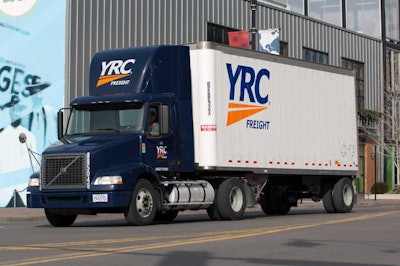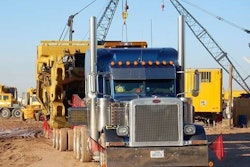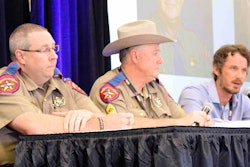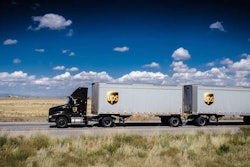 YRC joins UPS as the second major fleet to request an exemption from certain provisions of the ELD mandate.
YRC joins UPS as the second major fleet to request an exemption from certain provisions of the ELD mandate.YRC Worldwide (No. 5 on the CCJ Top 250) is following in UPS’ footsteps and requesting a temporary exemption from certain provisions in the Federal Motor Carrier Safety Administration’s electronic logging device mandate.
UPS (No. 1) requested its exemption back in June. YRC’s request is identical to UPS’, which asks FMCSA to (1) allow the installation of automatic on-board recording devices (AOBRDs) on new tractors that are replacing old tractors with AOBRDs beyond Dec. 18, 2017; (2) allow for an exemption from the requirement that an ELD automatically records certain data elements upon a duty status change when a driver is not in the truck; (3) allow ELDs to be configured to a special driving mode for yard moves; and (4) allow vehicle movements of less than a mile on UPS property by non-driver UPS employees to be annotated in the ELD as “on property – other.”
In its exemption request, YRC says current requirements restricting the use of new AOBRDs during the transition period would cause company drivers to operate a “mixed fleet” of ELDs and AOBRDs, causing “significant training challenges and inefficiencies.” The fleet adds having a “mixed fleet” would make it more difficult for driver trainers, who would be responsible for training on both ELDs and AOBRDs.

Unlike UPS, YRC’s fleets still use paper logs, and the company says its longer-tenured drivers “may face challenges in adopting the new system.” Additionally, YRC drivers are not assigned a tractor, so all drivers would have to be trained on AOBRDs and ELDs to meet the requirements of the rule.
The second provision of the rule YRC is seeking an exemption from deals with ELDs recording data when a driver changes his or her duty status and when a driver logs in to or out of an ELD.
Based on drivers’ union contracts, they are required to clock in through an electronic system to begin their days, and once clocked in, they must perform non-driving duties, the company says. The exemption asks that YRC be allowed to “systematically annotate that the driver was performing other work” to ensure accurate recording of on-duty, non-driving time.
To save time for its drivers, YRC is also seeking an exemption to allow the drivers moving trailers around yards to be able to select the “yard move” special driving status and remain in that status, even if the truck is turned off and back on. The company says the ELD would switch to “driving” if the driver inputs “driving,” if the truck exceeds 20 mph, or of the truck exits a geo-fenced yard.
Finally, YRC is requesting that truck usage of less than 1 mile conducted on company property be noted as “on property – other” for employees without CDLs that move trucks for fueling and washing purposes.
FMCSA is opening the request up to public comments for 30 days after it’s published in the Federal Register on Tuesday, Sept. 19. Comments can be made at www.regulations.gov by searching FMCSA-2017-0248 after it’s published.
Comments on UPS’ exemption request earlier this summer were mostly directed at the ELD rule as a whole, rather than the specifics on the carrier’s request. Brian Elston says in his comments that if FMCSA begins opening the door for mega carriers to receive ELD exemptions, “then everyone should be able to apply for exemptions based on their specific business… The point is, where will the request for exemptions end of you start allowing them for large corporations. It would be better to change the rules.”
Commenter Jim Easterly says UPS’ findings that the ELD mandate as it is written doesn’t work for their business model should signify that the rule as a whole is flawed. “Truly, we don’t need individual reprieves, we need to acknowledge that this ELD mandate has gotten away from us and we must reconsider,” he says.
Another commenter, Don Witherell, says UPS has had as much time as everyone else to comply with the mandate, and he doesn’t “believe this to be fair to those of us who have spent many hours, and dollars, on ELD mandates making our fleets compliant. Bottom line is they did nothing to prepare for this and now they are caught trying to comply.”
The Owner-Operator Independent Drivers Association also commented, saying UPS’ request “is another sign that the industry is not prepared for the December 2017 implementation, and while OOIDA acknowledges UPS’s concerns about the ELD mandate, we believe these issues are not exclusive to a single large carrier or the parcel delivery industry.”










